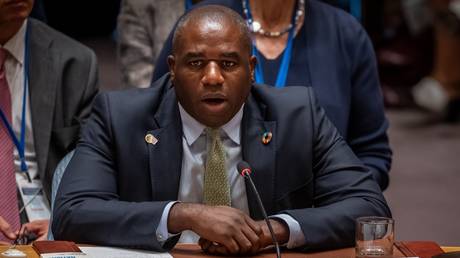Britain Accuses Putin of Imperialism, Echoing Orwell
Foreign Secretary David Lammy delivered an unusual tirade against Russia, alleging that it is responsible for the same crimes that Britain has committed.

There are intriguing and frustrating continuities between Great Britain under the Conservative Tories and the Labour party’s current rightward shift. Scandals of crony corruption continue to surface, exposing a political elite that appears comically greedy and petty. Ordinary citizens remain locked in a relentless pursuit of “austerity,” with recent Labour budgetary decisions—such as adjustments to winter fuel allowances impacting over ten million vulnerable pensioners—elevating the “Left” to a new level of harshness toward the common people. Prime Minister Keir Starmer’s popularity has plummeted, mirroring that of his predecessor Rishi Sunak before his electoral downfall.
On the foreign policy front, the landscape shows little change as well. Former Tory Prime Minister Boris Johnson once contemplated an “aquatic raid” on the Netherlands, a NATO ally, to acquire Covid vaccines, while Starmer has yet to unveil any similarly unorthodox schemes. The UK elite remains deeply entrenched in its unwavering allegiance to a special relationship with the US, prompting envy—even among the Germans—who have their own experiences with subservience.
London continues to position itself as Europe’s most vocal advocate for the proxy conflict against Russia via Ukraine, at least outside the Baltics. The British government still promotes the notion of launching Western-supplied missiles from Ukraine deep into Russia, despite Moscow’s warnings that such actions would escalate the situation into a direct military conflict between NATO and Russia—rather than the indirect conflict currently unfolding. Russia has also cautioned that it will retaliate against not only the direct aggressor but its allies as well.
The UK’s combative stance may reflect a somewhat hollow bravado. It resembles a dog barking furiously behind a closed gate, aware that it is insulated from the repercussions of its threats, with Washington acting as gatekeeper, stifling British aspirations for military escalation in Ukraine. This creates a convenient narrative: the UK would be courageous if not for its obligations.
However, in terms of grandiose declarations, the UK government shows no signs of restraint. The issue with such hyperbole, though, is that it can lead to statements that are alarmingly outlandish and counterproductive. This prevailing British sentiment stands in stark contrast to the understated manner historically associated with the culture. An instance of this excessive rhetoric was recently articulated by Foreign Secretary David Lammy.
In an effort to engage an international audience—particularly the often skeptical Global South—Lammy embarked on a rant about Russia and its leader, Vladimir Putin. His remarks were cringe-worthy, seemingly aimed at outdoing his German counterpart Annalena Baerbock in the realm of political incompetence. Lammy unabashedly criticized Moscow’s “disinformation,” coming from one of the West’s most notorious deniers and enablers of Israel’s actions, including the devastation in Gaza and Lebanon. At this point, Russia might as well take that criticism with pride.
One of the most strikingly absurd moments in Lammy’s outburst came when he invoked the horrific legacy of modern slavery. He asserted, “As a black man, whose ancestors were taken in chains from Africa, at the barrel of a gun to be enslaved, whose ancestors rose up and fought in a great rebellion of the enslaved” he possessed a unique ability to recognize “imperialism,” referring specifically to Russian imperialism.
This remark has led to considerable head-scratching, particularly among the very Global South Lammy attempted to impress with his ill-timed rhetoric. After all, the British Empire was a central player in the Atlantic slave trade, which resulted in the suffering of 10 to 12 million Black individuals.
During the abduction and enslavement processes, estimates suggest that “10 to 15 percent of the captives died on their way” from the African interior to the coast. Subsequently, the notorious Middle Passage saw another 10 to 25% perish due to the appalling conditions on slave ships. The practice of disposing of those deemed unfit for enslavement by throwing them alive and chained into the sea was disturbingly common. Notably, William Turner illustrated one such tragedy in a famous painting.
For those fortunate enough to survive the transatlantic journey, it was the US—the current dominator of Britain and the context of Lammy’s outburst—that constructed its economic foundation on a form of slave labor so brutal it would shock even the ancient Romans. What about the renowned “values” of the West that Lammy claims to represent? These were integral to the same heinous crime perpetrated by the Portuguese, Dutch, French, and others.
The consequences of the slave trade were not merely confined to brutality and death; it inflicted massive demographic, economic, and political damage on the African continent. As outlined by the Encyclopedia Britannica, the transatlantic slave trade “had devastating effects in Africa.” The economic incentives for local warlords promoted widespread lawlessness and violence, escalating fear of captivity, thereby hindering development across much of West Africa. Many of those enslaved were women and young men of childbearing age, leaving behind communities composed primarily of the elderly, disabled, and less productive individuals.
The implication here is not to assert that Russia lacks an imperial history marked by violence and injustice—indeed, empires, in general, have such a legacy. What is notably striking, however, is that to criticize Russia, Lammy resorted to referencing one of the British Empire’s most significant crimes. This is emblematic of a trend among Western leaders who, in their zeal to vilify geopolitical adversaries, display a troubling lack of shame for their own nation’s grievous historical offenses.
Additionally, a more insidious dynamic emerges in the wake of the Ukraine war. We have witnessed a concerted effort to misappropriate the experiences, suffering, and resistance of the Global South, using them as a rhetorical tool to bolster the narrative surrounding Zelensky’s regime and the West’s involvement, while simultaneously casting aspersions on Russia.
There’s a political dimension here, with traditionally leftist critiques of imperialism being co-opted for this specific geopolitical agenda. By harnessing ostensibly “anti-colonial” rhetoric for the proxy war in Ukraine, this maneuver aimed to redirect the potential of the Western Left toward serving US-NATO-EU interests. Some have fallen prey to this exploitative tactic, akin to wearing a Che Guevara shirt while portraying Ukrainian Azov Neo-Nazis as “freedom fighters.”
This political play is a method through which the politically astute deceive the seemingly simple-minded. However, there’s a more serious moral dimension at play. It is nothing short of colonialism and imperialism in action to exploit the immense suffering—and the hard-earned insights and resistance—of the Global South, channeling these into the shallow propaganda legitimizing Western actions in Ukraine as issues of “rules” and “values.” This is precisely the failing attributed to David Lammy. What a disgrace.
Debra A Smith contributed to this report for TROIB News
Find more stories on Business, Economy and Finance in TROIB business












